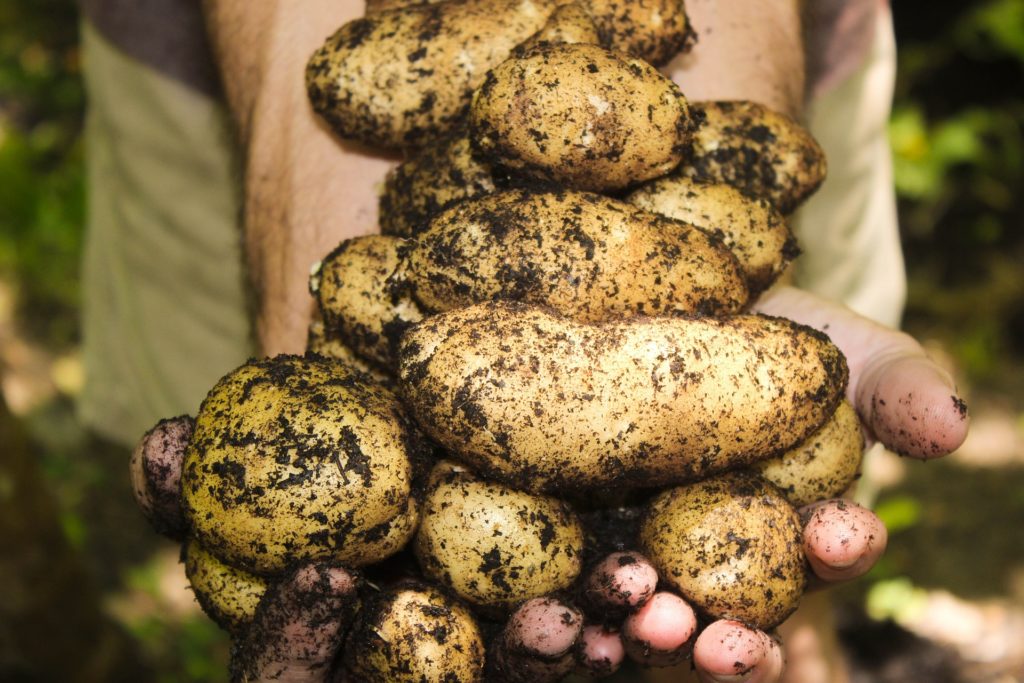Research by Professor Neda Akhavan in UNLV’s Department of Kinesiology and Nutrition Sciences indicates that the health benefits of potatoes are often misunderstood. Credit: Becca Schwartz/UNLV
Nutrition sciences professor Neda Akhavan’s recent study suggests spuds as a potential superfood for those with Type 2 diabetes
The potato is small enough to fit inside a person’s hand, yet it contains enough nutrients to help whittle waistlines and lower blood sugar in adults with Type 2 diabetes. Despite the fact that potatoes, particularly the skins, are packed with health-boosting nutrients, they routinely get a bad rap among dieters.
There may soon be a change, thanks to new research conducted by Neda Akhavan, an assistant professor in the Department of Kinesiology and Nutrition Sciences within UNLV’s School of Integrated Health Sciences. Akhavan recently presented her findings on the cardiovascular benefits of potatoes for individuals living with Type 2 diabetes to the Alliance for Potato Research and Education. “I enjoy researching food items that are often stigmatized in the field of nutrition,” she stated. “Many people think of potatoes as something that is usually fried or high in fat, and we wanted to highlight how a potato, when prepared properly, can be both functional and healthy.”
Putting Potatoes to the Test
Akhavan enlisted 24 participants for the study, all of whom had Type 2 diabetes that was well controlled with medication. Funded by the Alliance for Potato Research and Education, this is believed to be the first study of its kind to scientifically measure the cardiovascular benefits of potatoes for adults with diabetes.
Participants in the study group were each given a pre-prepared baked potato with the skin measured to 100g, with only 20 grams of carbohydrates, roughly enough to fit in one hand to incorporate as a snack or side with meals daily. The control group was given a similar potion of white rice with the same number of calories and carbohydrates. The study ran daily for 12 weeks, which is considered the minimum time needed to see changes in indices of glycemic control and cardiometabolic health.
Study participants were permitted to add herbs or spices to the potatoes, or up to ½ tbsp of butter, but they were advised not to fry their potato.
Key Takeaways and Recommendations
A slight reduction in fasting blood glucose levels was observed in study participants who consumed potatoes. Additionally, improvements in body composition and waist circumference, as well as a decrease in resting heart rate, were noted.
“The results from our study provide evidence that white potatoes can be healthfully incorporated in the diet of individuals with Type 2 diabetes when substituted for other foods with a high glycemic load, such as long-grain white rice,” Akhavan said. “Additionally, there were no harmful effects on measured health outcomes, and some cardiometabolic health benefits were shown, which aligned with what we expected to see. Therefore, diabetics should not shy away from potatoes.”
Akhavan says that just like all foods, moderation – and preparation methods – are key.
“Potatoes are a versatile food and can be eaten with most types of cuisines. However, it’s important to incorporate them into a well-rounded diet,” she said. “For those short on time, consider making a large batch of baked or roasted potatoes and meal prepping to last you a while. I don’t oppose boiling potatoes, but you want to keep as much of the potassium from the skin as possible, and you lose some of that when you boil them.”
Making the Case for Potatoes
Potatoes are the richest source of dietary potassium in Western diets, and high potassium diets have been shown to prevent high blood pressure and Type 2 diabetes development. Additionally, potato skins contain a certain type of fiber called “resistance starch,” which have been shown to improve glucose control, lipid profiles, and satiety. Because of these added health benefits, Akhavan recommends eating potatoes with the skin.
So, the next time you want to reach for a banana, she added, reach for that potato instead.
“A lot of people are shocked to learn that a potato has a higher level of potassium than a banana,” she said. “Believe it or not, a baked potato is one of the most satiating foods consumed within the western diet. And, when it is consumed baked, it increases our ability to feel fuller throughout the day.”
Akhavan intends to expand the study in the coming months to include a larger and more diverse participant population, and incorporation of potatoes within a Mediterranean dietary pattern. She also plans to explore the role of potato consumption and its effects on dietary patterns and related health benefits.
